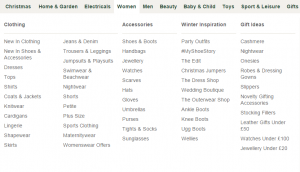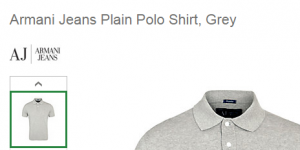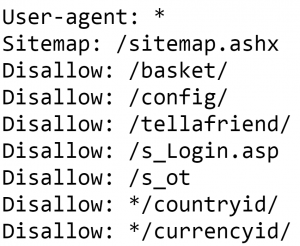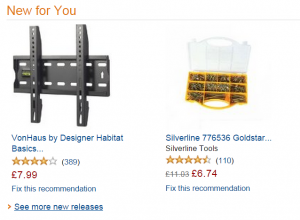Why is SEO important for ecommerce? Well, 44% of every online purchase begins with an online search (IPSOS 2012). Making sure that your products can be found easily on search engines such as Google can be the difference between an ecommerce business that fails or succeeds. A large part of effective Search Engine Optimisation (SEO) is to ensure that the pages of your site appear as relevant as possible to a search engine for the search terms (keywords) that your prospective customers are using.
Many business owners may be unaware that their ecommerce platform (some of them discussed here) might not be equipped with the features needed to make their online shop search-engine-friendly. Some ecommerce software offers only the most basic SEO features, some only at a premium cost while others do not offer them at all.
Example:
Let’s imagine that you are a retailer of men’s vintage-style clothing. One of your products is a 70’s-style, blue velvet jacket that you have named “Bradley.” You list the product in your ecommerce store as a “Bradley Jacket.”
Because of the limitations of your store-builder software, this name might automatically become the title of the product page, the page URL, and the name of the product in your site’s navigation.
Your prospective customers however are not searching for a “Bradley Jacket.” They are far more likely to be searching for “70’s style velvet jackets.” Realizing this, you now want to modify the page title to read “70s Style Velvet Jacket – Bradley | VeryVintage.com.”
With some ecommerce platforms you have no way to over-ride this or are forced to pay extra to have this feature.
Unfortunately, many business owners don’t become aware of this limitation until long after they have invested significant time uploading product images, product descriptions and stock information.
With that in mind, I conducted an evaluation of the most popular shopping cart platforms assessed purely on the basis of their SEO capabilities.
Research Methodology
The first step was to create a list of the most widely-used shopping cart platforms in Europe and the U.S (source: BuiltWith.com):
Magento![]() Shopify
Shopify![]() WooCommerce
WooCommerce![]() BigCommerce
BigCommerce![]() osCommerce
osCommerce![]() Wix
Wix![]() Weebly
Weebly![]() SquareSpace
SquareSpace![]() Volusion
Volusion![]() PrestaShop
PrestaShop![]() 3DCart
3DCart![]() ZenCart
ZenCart![]() GoDaddy
GoDaddy![]() MoonFruit
MoonFruit![]() 1&1
1&1 BigCartel
BigCartel![]()
I then evaluated each cart against a list of the Search Engine Ranking Factors as complied by Moz. Each factor was then assigned a weighting based on its correlation to an increased Google ranking in the Moz study.
List Of SEO Ranking Factors:
Here is the list of SEO ranking factors included in the study and a description of why they are important to your ecommerce business:
Independent Navigation Links
Weighting: 10/10
Definition:
 The navigation link is the text that appears for your products and product categories in the navigation menu of your site.
The navigation link is the text that appears for your products and product categories in the navigation menu of your site.
Some ecommerce platforms will automatically generate the navigation links in your menus using the same names as the products and product categories in your online store. For SEO purposes it would be preferable to have independent control of the navigation links.
Example:
While you may wish to give a product the name “Sony Bravia KDL50W8 LED HD 1080p 3D Smart TV, 50″ with Freeview/Freesat HD & 2x 3D Glasses, Silver”, you would almost certainly not wish the product to appear in this clunky manner in your navigation menu!
Findings:
All but three of the ecommerce platforms included in the study permit the use of independent navigation links. However, three of the platforms only provide this functionality with additional customization.
Independent Page Titles
Weighting: 10/10
Definition:
 The Page Title is the text that appears in the tab section at the top of the browser. It is also shown when a user bookmarks the page or saves it as a shortcut to their desktop. There is a strong correlation for Page Titles that include a key search term, particularly when the search term is placed at the beginning of the Page Title.
The Page Title is the text that appears in the tab section at the top of the browser. It is also shown when a user bookmarks the page or saves it as a shortcut to their desktop. There is a strong correlation for Page Titles that include a key search term, particularly when the search term is placed at the beginning of the Page Title.
Some ecommerce platforms will automatically generate page titles using the same names as the products and product categories in your online store.
Example:
You may have a dress listed under the product name of “Ruby”. It would be preferable for the page title to include a description of the product as close as possible to how your prospective customers are searching for it online e.g. “Sleeveless Maxi Dress – Ruby”.
Findings:
Two of the platforms included in the study (3DCart & BigCartel) do not offer this feature at all. Three other platforms offer this feature only with additional customisation that may require support from a developer.
Independent Page URLs
Weighting: 9/10
Definition:
![]()
The Page URL is the location of the page as shown in the address bar of the browser. There is good correlation for Page URLs that includes a key search term.
Some ecommerce platforms will automatically generate page URLs using the same names as the products and product categories in your online store. For SEO purposes it would be preferable to have independent control of the page URLs.
Example:
You may have a jacket listed under the product name of “Dakota.” It would be preferable for the page URL to include a description of the jacket close to how prospective customers might be searching for it online e.g. “http://www.YourShop.com/double-breasted-wool-coat-Dakota.”
Findings:
Two of the platforms included in the study (Wix & BigCartel) do not offer this feature at all. Four other platforms offer this feature only with additional customisation that may require support from a developer.
Independent Meta Descriptions
Weighting: 9/10
Definition:
 The Meta Description is the text that appears with your listing on the results page of Google. While the description does not directly impact your position in the search results, it can have a considerable impact on whether search visitors will click on your listing as opposed to one of your competitors.
The Meta Description is the text that appears with your listing on the results page of Google. While the description does not directly impact your position in the search results, it can have a considerable impact on whether search visitors will click on your listing as opposed to one of your competitors.
Some ecommerce platforms will automatically use the description shown on the page to create a default Meta description without giving you the option to independently control the text that appears with your Google listing.
The type of information that would be most suitable for a visitor comparing your site on Google will be quite different from the text you want to display on the page once they have arrived on your website.
Example:
An effective Meta Description should show the user that you are relevant to their search, convince them that your offer differs from others, and include a strong Call to Action.
Findings:
Two of the platforms included in the study (ZenCart & BigCartel) do not offer this feature at all. OsCommerce offers this feature but only as an additional add-on.
Independent Image ALT Tags
Weighting: 3/10
Definition:
 An ALT tag is text added to a product image to describe the image to search engines and users who are unable to view images in their browser. While the ALT tag does not have a particularly strong correlation to your ranking in the main Google search results, it may have a strong impact on the image’s appearance in Google’s Image Search results.
An ALT tag is text added to a product image to describe the image to search engines and users who are unable to view images in their browser. While the ALT tag does not have a particularly strong correlation to your ranking in the main Google search results, it may have a strong impact on the image’s appearance in Google’s Image Search results.
Example:
Some shopping cart software will automatically assign the product name to the ALT tag. If your product names are not descriptive of the product type e.g. “Danielle Dress” this could reduce your visibility for prospective customers using Google Image Search to find suitable products. In this case an ALT tag such as “Sleeveless Bodycon dress – Danielle” might be preferable.
Findings:
Three of the platforms included in the study (GoDaddy, BigCartel and PrestaShop) do not offer this feature at all. ZenCart and OsCommerce offer this feature only with additional customisation or as an add-on.
Independent H1 Headings
Weighting: 3/10
Definition:
 The H1 heading is typically designated as the main heading that appears on your product and category pages. There is good correlation for H1 headings that show relevance to a search term used on Google.
The H1 heading is typically designated as the main heading that appears on your product and category pages. There is good correlation for H1 headings that show relevance to a search term used on Google.
Example:
If you stock a product that matches a search term used by your prospective customers e.g. “Lace Cocktail Dress” it would be more beneficial if the H1 heading on the page included the same keywords.
Findings:
Most of the platforms scored quite poorly on this factor. Four of the platforms do not offer this feature at all, while five others offer it only as an add-on or with additional customisation.
Canonical URLs
Weighting: 7/10
Definition:
A Canonical URL is the original address of a page that could be found in more than one location.
Example:
It is not uncommon for the same product in an ecommerce store to be listed under multiple URLs. For example, a Children’s Garden Swing could be listed within a category of “Toys” and “Home & Garden.” This could result in the same product page appearing under two separate URLs e.g.
www.OnlineStore.com/shop/Toys/childrens-garden-swing
and also:
www.OnlineStore.com/shop/HomeandGarden/childrens-garden-swing
Search engines such as Google will view these URLs as two separate pages, both with identical content. As Google does not look favorably on duplicated content, this could prevent either page ranking prominently in their search results. A site that contains a large amount of duplicated content also runs the risk of being penalized by Google.
To avoid this problem, Google provides the “REL CANONICAL” tag which allows you to specify which URL should be regarded as the preferred version of the page.
Findings:
Only a minority of the ecommerce platforms included in the study provided a facility to use the REL CANONICAL tag. Five of the platforms do not offer this feature at all while four others only include this as a premium feature at additional cost.
Integrated Blogging Platform
Weighting: 10/10
Definition:
Apart from having pages on your site that look relevant for the search terms used by your prospective customers, the single most important factor that affects how prominently your site appears in Google’s search results is the number – and quality of – external links pointing to your site.
Few sites have products that are so unique and newsworthy that other sites will want to link directly to your commercial pages. You are far more likely to attract external links by having a blog that contains topical, engaging and shareable editorial-style content.
Findings:
Some of the ecommerce platforms do not include a blog as a standard feature. You are forced to either pay an additional premium or use an external blogging platform which may not replicate the exact branding or navigation of your online shop.
If your blog is not listed under the same domain name as your online store any external links pointing to your blog will be of little or no benefit to the ranking of your products in Google’s search results.
For this reason, I consider it essential that your ecommerce store includes a fully-integrated blog available on the same domain name as your main website.
Social Sharing Buttons
Weighting: 8/10
Definition:
![]() Social sharing buttons are comprised of easily-recognizable icons that allow your visitors to share your site, products and blog posts on the most popular social networks.
Social sharing buttons are comprised of easily-recognizable icons that allow your visitors to share your site, products and blog posts on the most popular social networks.
Example:
Providing your visitors with a simple means of sharing your online content is an essential feature to help your online marketing and expose your products to prospective customers who are not already familiar with your brand.
Findings:
Some ecommerce platforms only provide this feature at an additional premium. Others offer it only for Facebook, or not at all.
Auto XML Sitemap
Weighting: 9/10
Definition:
An XML sitemap is a file located on your web server to help search engines find and index your content. As an example, you can view the XML sitemap for my website here.
Note that the XML sitemap differs from an HTML sitemap which is designed to help human visitors find the content on your website.
Example:
Maintaining an XML site for an ecommerce site which could contain thousands of unique product pages is not a task that you would want to perform manually. A good ecommerce platform will automatically generate an XML sitemap whenever a new page is added to, or removed from, your website.
Findings:
While most platforms do offer automated XML sitemaps, others only offer this as a premium add-on at additional cost.
Use Of Own Domain Name
Weighting: 10/10
Definition:
A domain name is the unique name by which your website is found on the internet. Your domain name will typically be the same as your business name e.g. asos.com
Having your own domain name is – without doubt – the single most important factor to consider when setting up an online store.
Findings:
While most ecommerce platforms will allow you to use your own domain name, some only offer this as a premium feature and others only at an additional cost. This can result in some business owners making the error of accepting a free branded subdomain when launching their online store. e.g. www.yourbusinessname.moonfruit.com where Moonfruit is the name of the ecommerce platform provider.
Not only could this make your business appear less professional, it also means that any external links pointing to your website will primarily benefit the platform provider, and not you!
In addition, should you ever decide to move from your current provider in the future (as you inevitably will), you will not be able to transfer the domain name and will therefore lose any link authority that you may have earned. You will also be unable to redirect visitors from the old domain to the new location of your website.
I would strongly urge you to never consider using a domain name that is not exclusive to your business and registered in your own name. I would even go one step further and suggest that you register your domain name with a third party domain registrar and not with the same company that host your shopping cart. It is never a good idea to place all of your eggs in one shopping basket!
Own IP Address
Weighting: 2/10
Definition:
An IP address is a unique number that represents the location of your website on the Internet. We could, for example, access Amazon’s website via the domain name Amazon.com or via its IP address at 72.21.215.232. We generally prefer to use easier-to-remember domain names as opposed to an IP addresses when we wish to visit a website.
On some hosted ecommerce platforms the same IP address may be allocated to multiple websites.
The potential disadvantages of sharing an IP address with another business are as follows:
Another website sharing the same IP address could affect the performance and reliability of your website. This could potentially cause your site to become unavailable or to suffer a ranking drop on Google for performance-related issues.
If another website sharing your IP address behaves unethically i.e. sending spam emails, buying paid backlinks etc. this could result in your own website being blocked by spam filters or being penalized by Google for manipulative practices.
Findings:
Most of the hosted ecommerce platform providers do not provide you with your own IP address. Although they will hopefully be taking steps to prevent another client’s activities negatively impacting your website, for all but the smallest businesses, I would recommend that you consider a self-hosted solution that allows you to use your own unique IP address.
301 Redirects
Definition:
A 301 redirection is a command used to redirect a browser or search engine from one URL to another.
Example:
It is very common for a product or even an entire product category to be removed from the range when it becomes no longer available. While the business owner could simply remove the product or product category from the online store, this runs the risk that another website (or even another page on your own site) could now be linking to a URL that no longer exists.
Apart from the fact that will cause an unwelcome “404 page not found” error when someone tries to access the missing URL, it also means that any external links pointing to the missing page are no longer able to pass any link authority. This could result in your website losing its ranking for certain key search terms on Google.
Findings:
While most of the ecommerce platforms will provide you with a feature to redirect any obsolete URLs to a new URL, others include this only as a premium feature at additional cost.
Robots Noindex
Definition:
 A robotx.txt file is a file located on your web server that informs a search engine which pages or sections of your website it should, or should not, index.
A robotx.txt file is a file located on your web server that informs a search engine which pages or sections of your website it should, or should not, index.
The depth to which a search engine will index your website is largely based on the authority your site has earned as a result of the number and quality of external links pointing to your site. As a general rule, the higher your Domain Authority, the more of your pages the search engine will crawl.
Example:
For an ecommerce store that could potentially be listing several thousand products it is preferable that the search engine crawls your product and product category pages rather than folders containing scripts, images or data. This increases the chance of your products being indexed by Google and also reduces the bandwidth used by your server.
Findings:
Most of the ecommerce platforms automatically generate a robots.txt file based on a set of standard assumptions about which folders you would prefer not be crawled. Some platforms also allow you to have manual control of this file while others charge an additional premium to access this feature. Notably, Weebly & 1&1 do not provide this feature at all.
Ecommerce Platform SEO Scores
Platform Name
Logo
SEO Score
Magento 100
Shopify 98
WooCommerce 98
BigCommerce 91
SquareSpace 91
Volusion 88
3DCart 88
GoDaddy 78
Weebly 72
Wix 68
MoonFruit 51
1&1 40
40 BigCartel 33
PrestaShop 28
ZenCart 12
osCommerce 10
View the full table here with a detailed breakdown of individual features
Other features not included in the study
While I did not include the following features in this study, you may also wish to consider these factors when evaluating which platform to choose for your ecommerce business.
Feature products on the home page
 Being able to feature popular or “best-selling” products on the home page of your site not only reduces the possibility of visitors bouncing from your home page, it could also give a search ranking boost to those products featured.
Being able to feature popular or “best-selling” products on the home page of your site not only reduces the possibility of visitors bouncing from your home page, it could also give a search ranking boost to those products featured.
As the home page of a website is often the page with the highest link authority, any pages linked directly from the home page will in turn receive a higher proportion of any link authority passed to them from the home page.
Product Reviews
One way to avoid duplicate content penalties on pages displaying similar products is to include unique product reviews or some other form of User Generated Content (UGC) on the product page. Product reviews may also be viewed favourably by consumers when considering which product to buy.
Internal site search
![]() Having an internal search facility by which visitors can search within your site for products that match their keywords is often viewed favorably by consumers.
Having an internal search facility by which visitors can search within your site for products that match their keywords is often viewed favorably by consumers.
Using a tool such as Google Analytics you could then analyse the most popular search terms used within your site. This can help you determine how to best name your products and product categories and even influence the type of products that you may wish to stock in the future.
Non-SEO Related Features
SEO features are not the only factors to consider when choosing an ecommerce platform for your business. You should also consider:
- Cost (monthly ongoing platform costs, premium add-ons and transaction charges)
- Ease of use (Complex platforms might require additional staff training costs)
- Customer Support (If your site goes down at 3am on the Sunday before Christmas will someone be there to help you?)
- Choice of Payment Gateways (e.g. PayPal, WorldPay etc.)
- Integration with your existing EPOS and accounting software
- Scalability (will the platform be able to grow with your business?)
- Mobile Friendly (an increasing number of consumers are now shopping on mobile devices)
- Security (Will your customers’ payment and contact details be secure?)
- Risk of Service Termination (Magento, for example, recently terminated their ‘Magento Go’ service forcing all users to either leave or migrate to another service)
Conclusion
Choosing an ecommerce platform for your online business is not a decision to be taken lightly. While you might be tempted to use the most well-known provider offering you the cheapest and easiest solution, this is a decision you could come to regret.
If you later find that your inability to attract and convert visitors is restricted – not by the appeal of your products – but by the limited features of your ecommerce platform, you might wish you had spent more time researching the best solution before you invested time and money in a second-rate platform.
All of the ecommerce platforms that scored in the top 3 positions of this study (Magento, WooCommerce & Shopify) should be a pretty safe bet for most small to medium-sized ecommerce businesses.
My personal preference would be to use a well-supported, self-hosted, customisable, open-source solution such as WooCommerce which offers a wide range of free or low cost add-ons.
While BigCartel did not receive the lowest score in this study, it did stand out as the platform for which most of the SEO features included in the study were not available even at additional cost.
This is an independent study for which I receive no incentive (financial or otherwise) from any of the cart vendors included in this post.
Digital & Social Articles on Business 2 Community
(536)
Report Post






